
Jillian Sullivan on her partner, the legendary Brian Turner, living with Alzheimer's in Oturehua
Days of sun forecast and the fresh-cut hay in the paddock has the odds in its favour. White tufty clouds over Blackstone Hill, the air smelling of anise and spice.
Once it was so cold here the birds fell from the sky. So cold we could walk on my pond, and the fire flamed all day and night (and still does in winter) but now it’s the wind, the tussocks rippling and the land dry.
Once there were mainly farmers and truck drivers who lived here, a store keeper, publican, the strong-thighed farm workers. Then a poet came to this street – houses up one side and down, maybe twenty people who lived here, and the Hawkduns and Mt Ida at the end of the road.
People come for many reasons and loss is a common one. Here the land takes you aside and gives you a ruffling then shows you the stars. The Ida Burn stream wanders by. The tors are warm and rough and every time you see them they are changed by light, and every time you visit them they are what they have always been. Only the lichen crumbles, dies and is reborn. After that, you stay here. For how do you leave that which holds you with so much space above it feels as if everything is possible and hope abounds, or at the least, redemption.
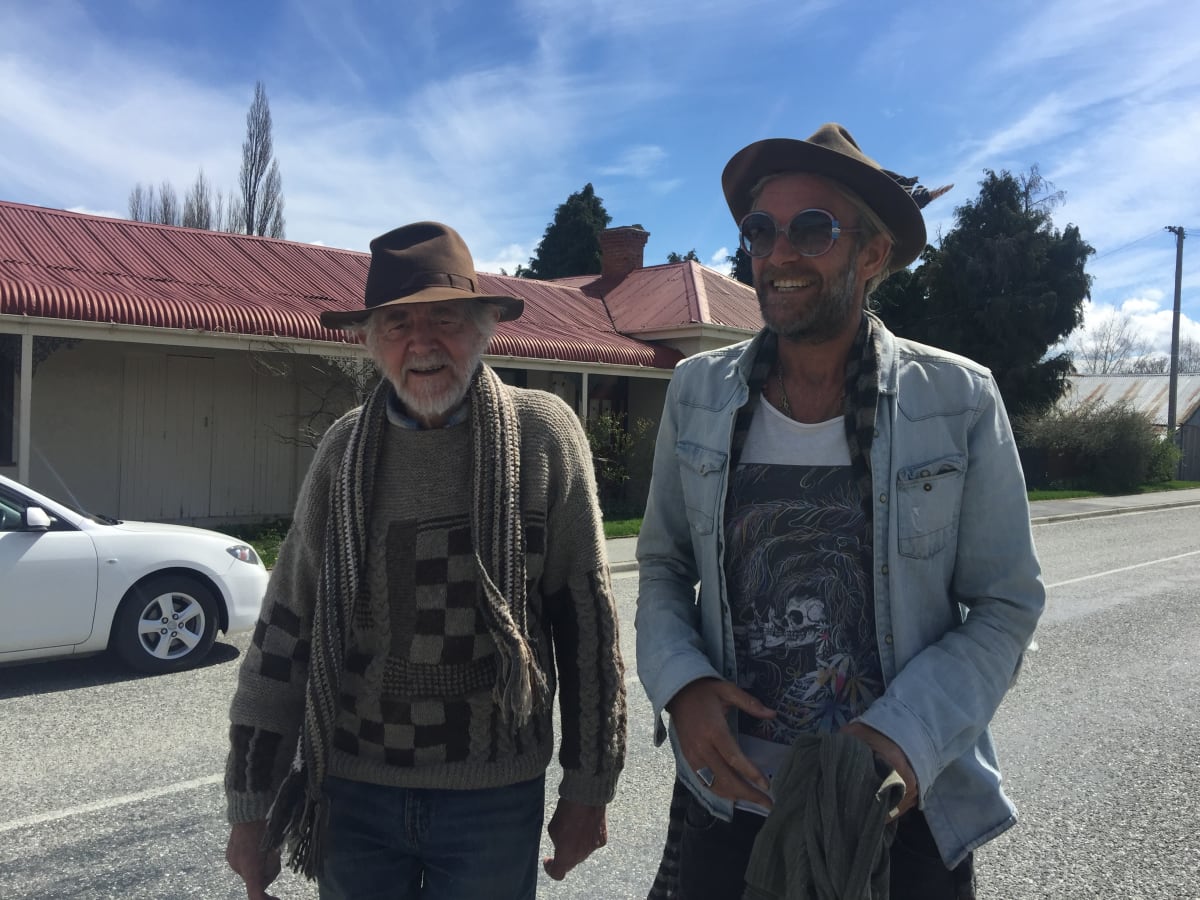
Here he walked from his small red house to the store, to the stream, to the hills, circumscribing a new habitat, and whether it sang for him or he to it, his words now paint the land and hold it sacrosanct. A slight of fate brought him here, and maybe it is true in some way, as the farmers say, that we began to come here because of him. Or maybe it was the scent of rock, something to stand on and start from, that brought us here, loss indecipherable in our stories, and the wind, the wind, the sky making us anew.
…I didn’t want to own
or sell anything so grand
and communal as land,
all I needed
was the right to belong,
one’s spirit all the colours
of the spectrum,
like the sky.
- BT, "Taieri Days" *
Writer and film-maker Kathleen Gallagher calls him "Guardian of this land. Wise in spirit. His words calling us to account.” His words, and 50 years of environmental activism, from the Save Manapouri campaign to his advocacy today for the Manuherekia River.
Writer and neighbour Mike Riddell calls him a nature sacramentalist. “It’s my own term,” Mike tells Brian. “It refers to your connection to the land and then to something beyond.”
Today he’ll chainsaw wood, carry cylindrical logs to his fire, email friends, write words in his scrawly writing in his red notebook, tramp across the paddock to the stream, depleted and algaed and silted, and think of the way the water sings and shines higher up near the mountain it comes from. For now toast and cups of tea at the wooden table and a future neither of us can comprehend, only that the strongest way to face anything is to embrace each moment.
He says his brain feels like a shower of asteroids coming at him. “But I’m not going to whinge. I’m not going to look at the future. I’m going to live each day.”
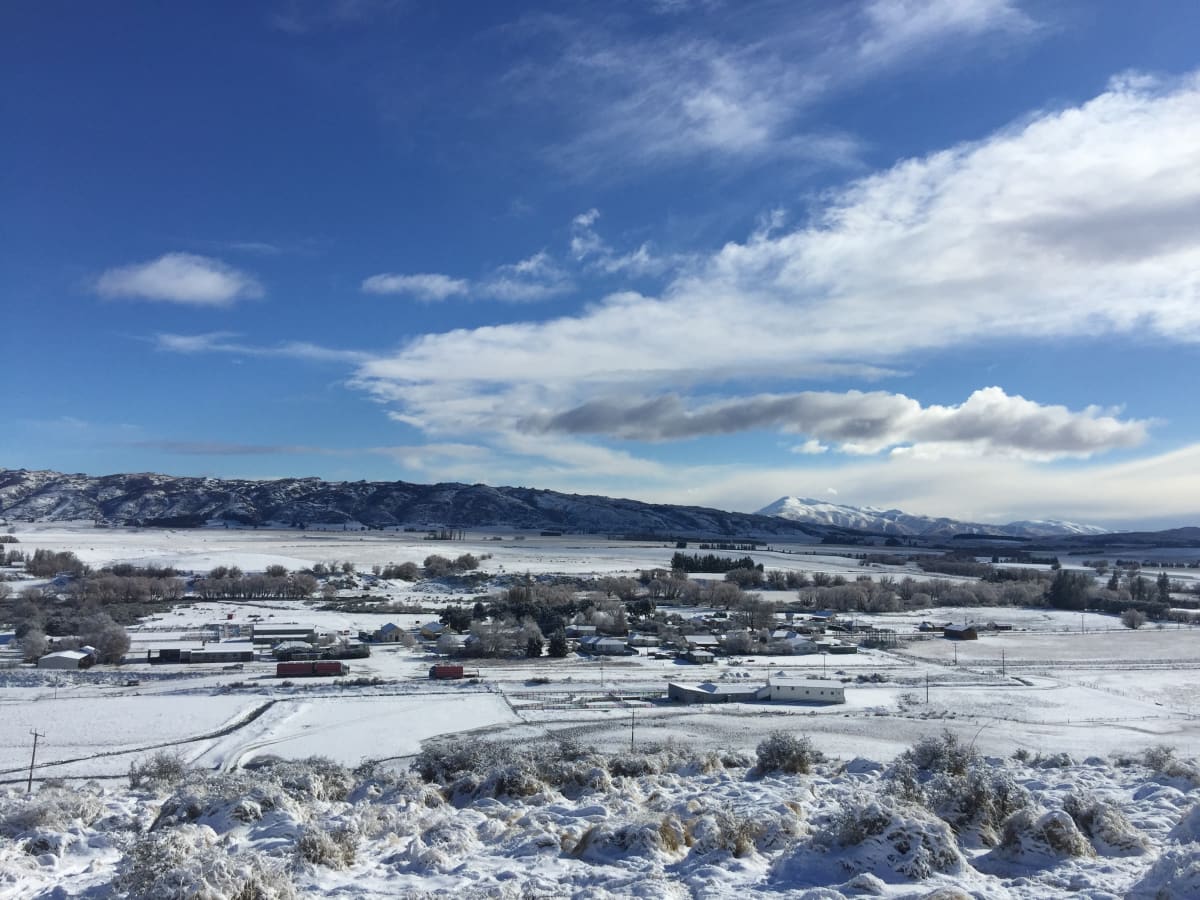
Frost that morning, the paddocks gilded silver with the sun and the sky gilded too with cloud. Mt Ida and the Hawkduns blue and solid and believable at the end of the road.
…And there comes a time
when all hills
are mountains. Now is the time.
If rain is to fall
let it fall gently
on the shoulders of the mountains,
and let it run quietly
and quickly
into the river
that feels the light in the sky
and prizes the light.
- BT, "River Wind"
*
After a night of rain the air cool with the droplets of dew and the smell of soaked earth. The one orange poppy has held on through the onslaught, bright and open to the grey sky.
I ask him what it feels like when he is ‘scrambled’, when a plan made ten minutes earlier is not recalled. His face searches. He says, there’s just nothing there.
But poetry is immediate. The lines written and the lines read. The discussion and insights on what he’s just read. Still there. Still as much a part of his life as laughing, or music.
When he speaks about his life he speaks of his father and mother and brothers, Glenn and Greg. They are his compost and his bedrock. He speaks of his son Andre, far away in London, the man of whom he is most proud. He speaks of the land he has climbed and tramped, the seas he has sailed and the rivers he has walked.
He doesn’t speak much of regret, but regret hoods his eyes. He is broken and rebroken, and he broke and rebroke. What memories now?
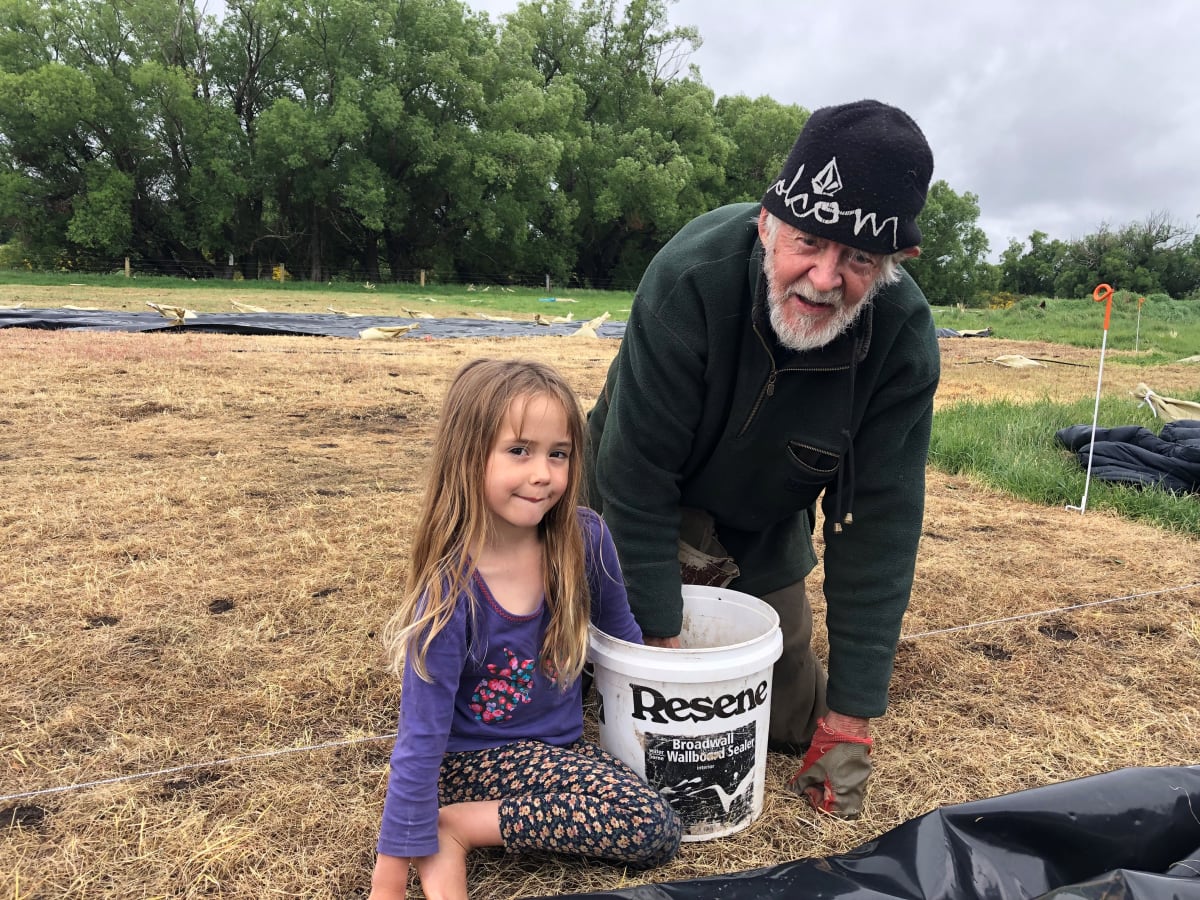
I don’t know how he views the past except that it has made him, and he is a gentleman, kindness in his chromosomes. On our knees in the newly sown hemp rows, the earth damp and warm and fecund beneath us. We place handfuls of compost over each pinch of seed in its dark hole, five year old Lucia running barefoot up the rows after birds, her arms wide open. She is not his grand-daughter and these are not his seeds. It is not a comfortable job for him, bent and crimped, the rows 100 metres long, but he is there crouched beside me.
What music is there flowing unheard,
what songs unsung because we have no heart
to sing, our convictions fruitless
without courage?
- BT, "Song"
I cannot doubt his courage.
Once he trained with the pro-riders on a circuit in Spain, tailing seven times Tour de France rider Julian Dean. And wrote about it. Once he rode and pushed his bike to the top of the highest mountain in Spain. The trampers already on top cheered him. Here, he’s won cycling classics: Oamaru to Dunedin, the Kelvin Hastie Memorial road race from Miller’s Flat to Mosgiel, and others. And written about it. On the road training, he leans forward, hands light on the handlebars, pushing the pedals around and around, willing the breath to suck on past the limits of tissue and muscle and bone that constricts. “To be a cyclist you have to know how to suffer,” he says. He’s always prepared to suffer for his cycling, to be able to go out there and “thunder down the valley.”, his heart pumping, his bike flying.
“It doesn’t come easily,” he wrote of cycling in his essay "Open Road" in The Griffith Review. It requires work, skill, persistence, he says, and endurance, courage; actions he says apply to writing as well. “Because sometimes it hurts, quite a lot, especially on the climbs or into a headwind that’s unrelenting, buffeting. The weather’s changing, there’s spitting cold rain – sometimes hard rain – and you’re still an hour or more away from home. Keep going, keep going, don’t give up.”
Don’t give up.
Then in his essay he turns and angles his vision on the ‘conspicuously wealthy.’ How many of those, he wonders, “know in their hearts that much of what they have acquired is not earned, has come at others’ expense.”
“From an early age,” he tells me, “I’ve seen the world around us as wondrous. That’s why I’m so irked and irritated at the people who are fucking up this planet.”
*
A mid-summer ride in the Ida Valley. We pass through verges of wild flowers: turquoise vipers bugloss, pale yellow potentilla, the deeper yellow of St Johns wort, red clover, white yarrow, pink mellow, dark purple lucerne. Beyond the flowers, the fields of mown hay strew warm -grass scent in the air. Our tyres scritch on the gravel road. Stones plink in our spokes. The trees bloom too along the road sides: hawthorns budding up with small berries, old apple trees with russet fruit, elderflower trees with palms of white flowers. The blue sky crammed with white clouds in every configuration.
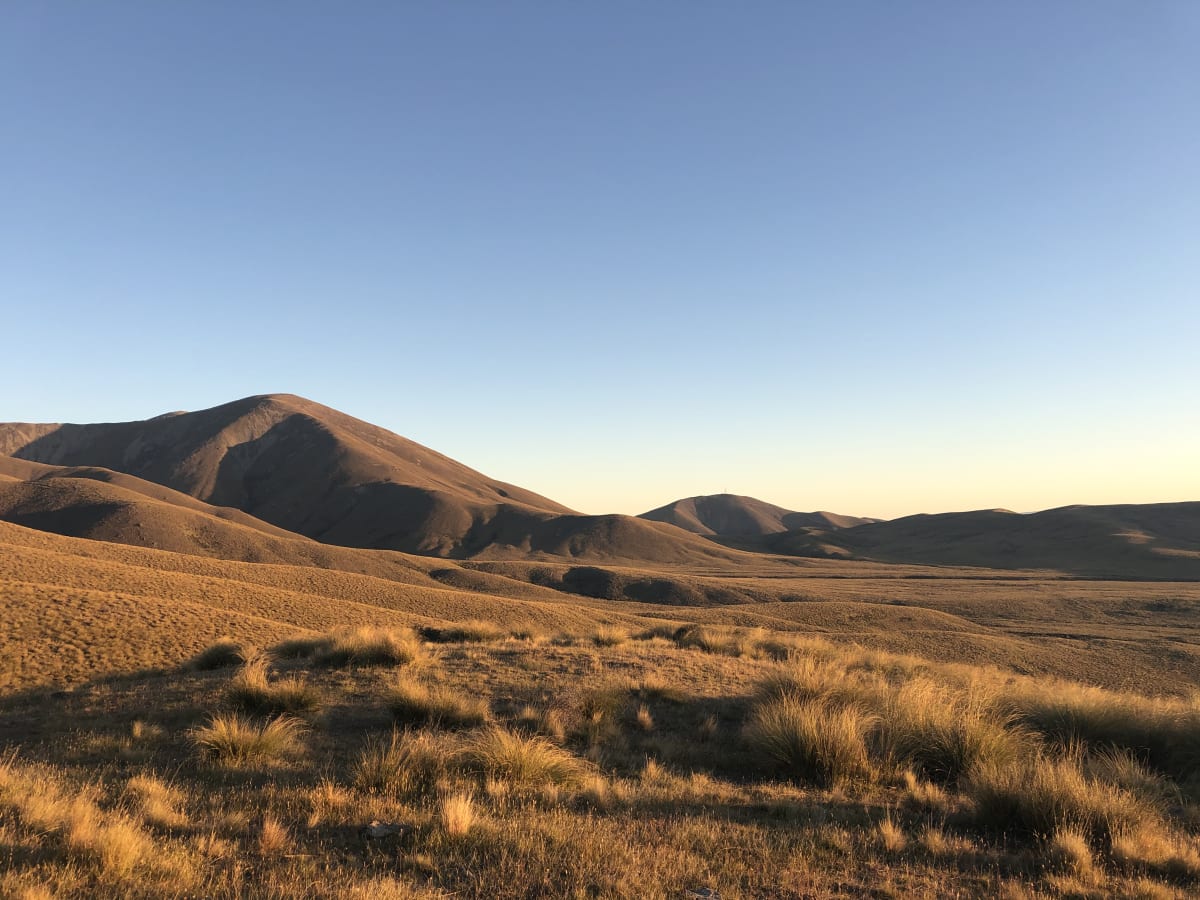
Perhaps too much looking about and not enough at the gravel on the road. My back tyre punctures. Brian rides away home to get the car. His red and white King of the Mountain cycling shirt (handed down from Julian Dean) flashes between spires of grass. I pick a bunch of wildflowers and start wheeling my bike.
“I gave it everything,” he tells me later. “I pretended I’d broken away from the bunch. I didn’t want to leave you too long walking in the hot sun.” But a farmer, Ken, stopped and picked me up.
This morning it snowed, the world all white, and then it melted and made mud out of patches of dirt on the lawn, and now melty grey clouds close in, may transform what we see yet again. Yet again.
We lose control: of time, of weather. Control of what may be coming towards us – a snowstorm, a deer leaping in the fog, the flooded stream rising. Or blessings, unasked for opportunities, a person on a trajectory towards your path, good luck. We lose control of memories that arise unbidden with a song, a hammer that slips and falls three metres, control of who is voted in or voted out. The sun. The rain. Hail. Snow again, so you have to turn back at the foot of the hill, flakes smothering the windscreen.
And then there are things to be collected. Tests. In the city, in the town, with this doctor, with this specialist. Collecting results and all the results are spiffing. Everything better than it should be – iron, B12, blood pressure, cholesterol. There is no psychosis, no alcholicism, no anxiety syndrome, no depression. Lists of things you’re not. Also not angry, not bitter, not argumentative, not blaming.
Collection of images, without dye and with dye. Collection of oneself to drive to the doctor. Signing in for Covid. Choosing two chairs together.
Your name called. A collection of things the doctor says and we sit there calmly. You ask about cycling. “Yes that’s good,” the doctor says. “Keep it up.”
A farmer asked me
if I was working
and added
he didn’t mean writing.
I said
I was sawing
and stacking wood,
tidying the shed,
pruning the hedge.
Is that work?”
“Yes,” he said, “keep it up.”
- BT, "Keep It Up" *
We walk out like everyday people and sit in the car. We are collecting our thoughts.
“I’ve been here before,” you say. “You just have to carry on.”
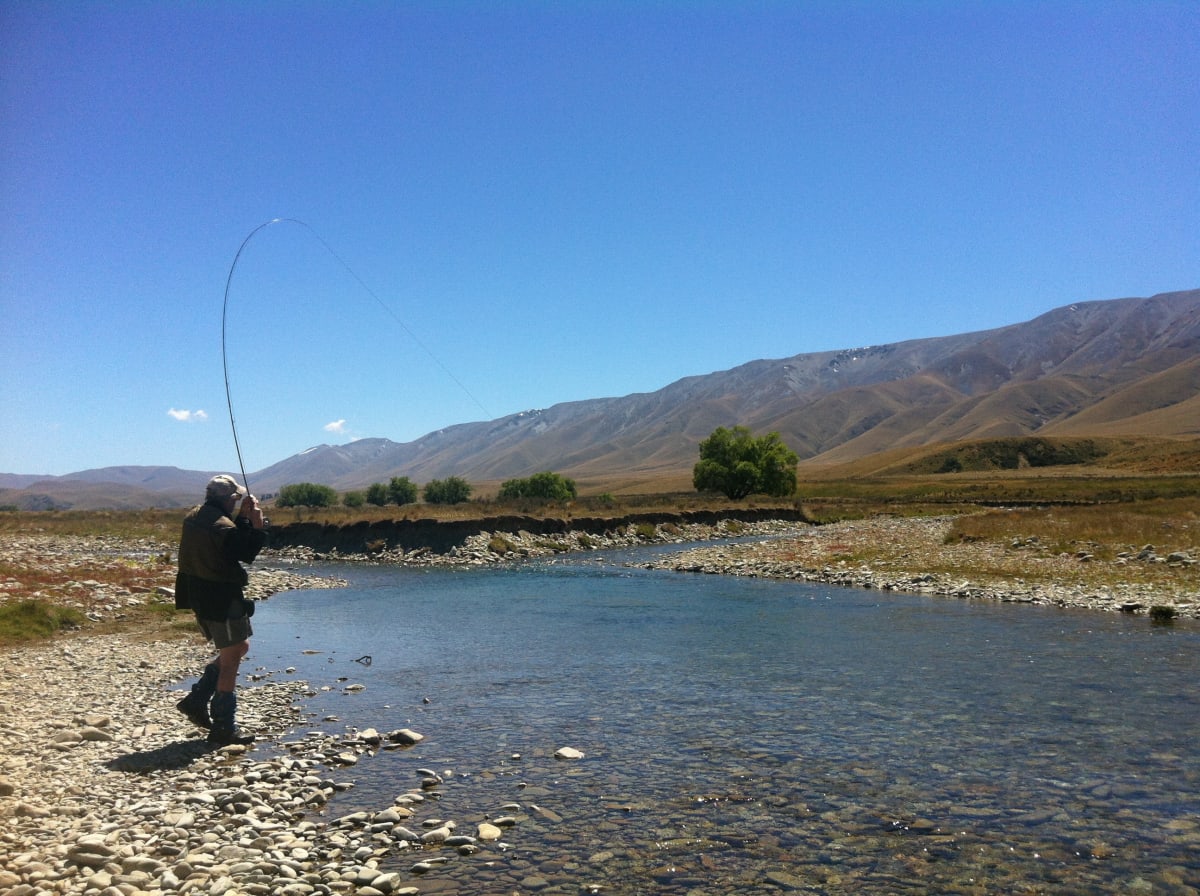
Time has become something we number. Not just us. Who else has asked: how many years? How many moments? And what do you do with each of them now you know how adventurous, how shiny, how wide, how uncontrolled, how unknowing, how pristine and bestowed. A face turned up to snow falling from the sky, the air filled with unimaginable numbers of snowflakes, eternal snowflakes, from a sky as endless and deep as hope.
On the way to the café we see an unfamiliar car pull up at Brian’s house. We go back because it’s usually someone calling in – a writer passing through town, someone Brian once published or mentored or supported, or someone who loves Brian’s work with a book to be signed, or to say come for dinner, or a coffee. Today it’s the writer and Emeritus Professor Erik Olssen and his wife Annabel. Brian published Erik’s book A History of Otago during a 10-year stint as Managing Editor for John McIndoe in Dunedin. John took Brian on as editor, in 1975, trusting Brian to use his connections and knowledge to build a literary publishing house. “I don’t think he turned down anyone I said I wanted to publish,” Brian told me. Lynley Hood quotes Brian in an article for NZ Books: “John often used to say: 'We need a more civilised society.' He and I agreed utterly on that. And one way to create a more civilised society is to publish a greater range of books.… We published books that contributed to New Zealand’s literary heritage, even if their chances of making a profit were slight.” Authors Brian championed included Cilla McQueen, bringing out her first poetry collection Homing In, Elizabeth Smither, Vincent O’Sullivan, Ruth Dallas, Hone Tuwhare, and Owen Marshall.
It seems a madness to try growing hemp in the hottest coldest driest valley in the country. To bring forth something so green and many-fronded out of a stony paddock, unsheltered and high above the stream. This belief in the possible – as if work itself, and not weather or soil, is the answer. At least work is something you can tangle with head on. Four tonnes of sand to be shovelled into four hundred sandbags to hold down hundreds of metres of black polythene to kill the grass and weeds instead of using poison and then to drill by hand (10,000 times) the small holes for the small dark seeds, and think work alone may suffice. Taking action in the face of the inexplicable is a form of keeping on.
Brian and I in the trucking yard with the sacks and the hill of stony sand. The wind, and the trucks pulling in to load superphosphate, the powder spinning across the yard into our faces. Counting the shovelfuls, 10 per sack, counting the sacks, 25 per trailer load.
At the pub that night, Grim, truck driver and Brian’s friend, says to me “You’d better not let Brian pay for any beer. He’s working too hard.”
“I’m paying,” I tell him. “Though at lunch time I had to go home and lie on the floor, and he went for a 45-minute bike ride.”
“You’re buying,” says Grim.
At the door, the publican Graeme asks me, “How’s Brian doing?"
“He’s doing pretty good.”
“Everyone’s upset about it,” Graeme says. “They’re all looking out for him.”
“I didn’t know if anyone knew.”
“Everyone knows,” he says, “It’s a small town.”
If I give praise
it is because I walk unmolested
among jumbled, broken rock
on a morning made to be used
but not undone.
I am learning to live with the mountain.
- BT, "Madness and the Mountain"
*
In the ranges he is typically above me. His lean frame bends its will to the slope and chatter of stones. The harsh ministrations of the speargrass he understands and avoids. His boots old, tongued, familiar allies. He has lent me his ice axe for balancing. My fingers warm on the worn oak handle which once supported him on the top of Aoraki, on Mt Aspiring, Earnslaw, in the Darren Mountains, and soloing up the face of the Remarkables (“a shingly, crumbly mess”). To see him move upwards through tussock, foot sure across the steep shingled slope, is to let all other titles fall away: poet, sportsman, cyclist, editor, biographer. Whatever shape he’s been, here, under the hot sky, he is only what the land reads of him– water and atoms. He is diffused.
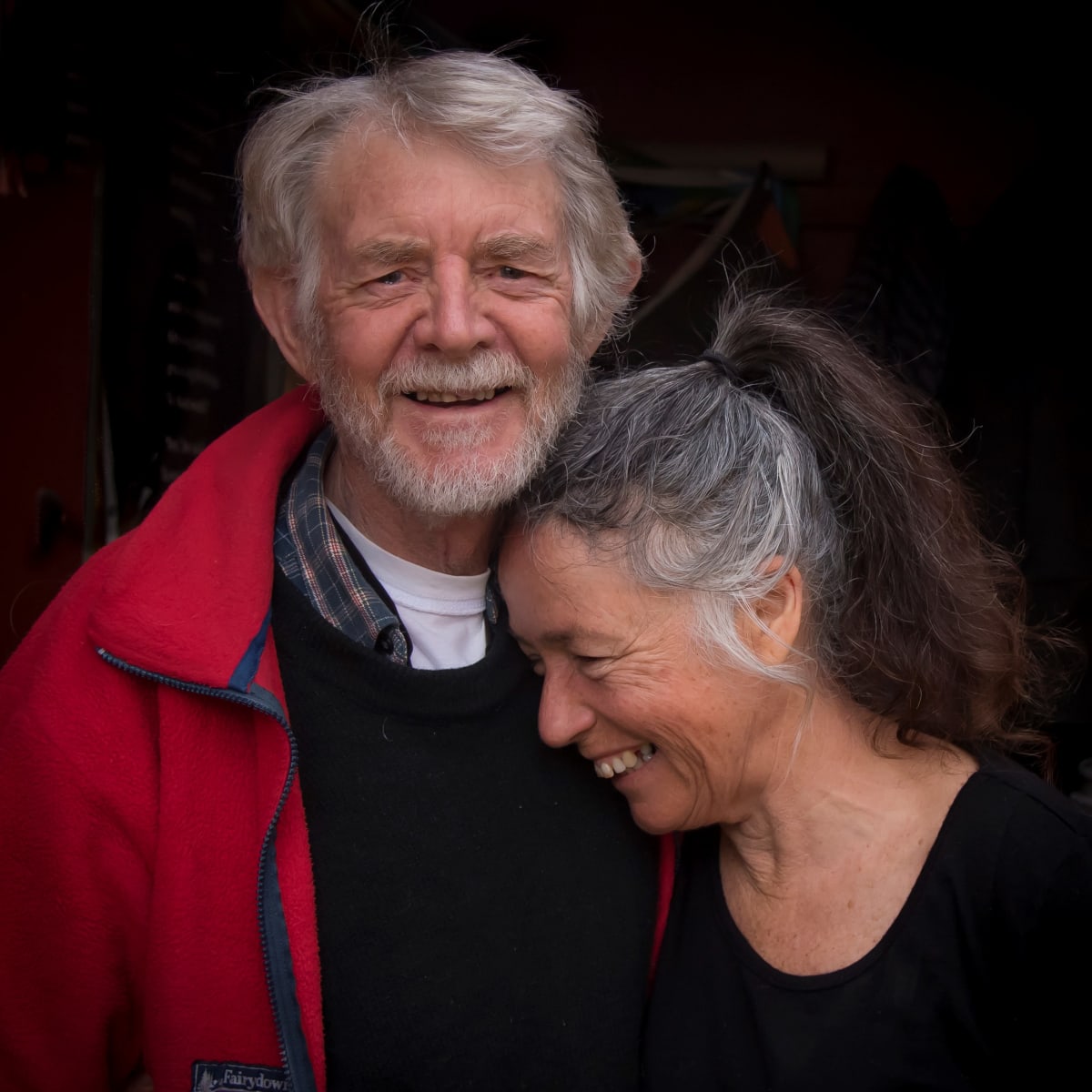
I breathe heavily and stumble on the rocks. If there were stars now he could keep going till he touched them. He doesn’t give in. His large heart beating like boulders that time they sailed over his head, missiles from the mountaintop thumping and thumping into the snow.
His heartbeat a whisper in his ears, like the sound of wind over tussock that time at the head of Rocks Creek, where the creek diverged and led up each side of a gully on Mt St Bathans, and the wind was so fierce the tussocks lent over and we lent back into the wind, trusting.
We didn’t know the future then, as we walked back down, past a glade of foxgloves and beneath the black shags imperious on the cliff top and through the stream where small trout skittered at our shadows, as if we were shags come to pry them. But we were only passing through.
It’s then, when we walk not speaking, our commonality the feeling solitude and wonder brings, that I see him as he longs to be – not tied to pain or stiffness or memory but sylph-like and transparent, like the fingerlings in the mountain stream; incandescent and flowing together. Wind, sky, a body in its thrall and a mind as wide as the valley, saying yes to everything.
What stops us falling apart?
Somewhere, somehow
a lover and friends
are on call and stand
by. Love and bless
them, dearest friends…
- BT, January 22, 2022 Brian Turner is the author of numerous collections of poetry, the memoir Somebodies and Nobodies, biographies of Colin Meads and Anton Oliver, and the essay collection Into the Wider World (2009). His most recent book is Landmarks (Penguin, 2020), co-authored with Owen Marshall and Grahame Sydney. Jill Sullivan is the author of Map for the Heart: Ida Valley Essays (Otago University Press, 2020).
Tomorrow in ReadingRoom: Wellington novelist Chloe Lane on being hit by a car while crossing the road.







